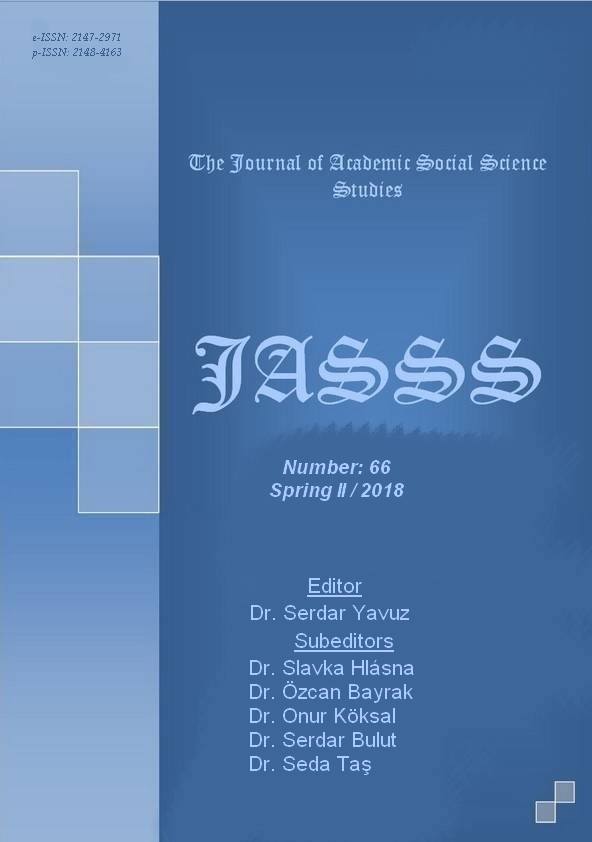ELİF ŞAFAK'IN "AŞK", "USTAM VE BEN", "İSKENDER", "BABA VE PİÇ" ROMANLARINDA ANAKRONİK SAPTAMALAR VE ORYANTALİST EĞİLİMLER
Author :
Abstract
Elif Şafak, kültürel ve ilmi kaynağının da merkezi olan Batı'nın odağıyla romanlarını olaylaştırması, eserini anakronik ve kurgusal boşluğa iter. Bu durum öteki bakış açısıyla oluşturulan Doğu toplumunu Batı merkezli yorumlamanın sebebiyle oluşan bir sonuçtur. Eserlerde sıklıkla karşılaştığımız üslup probleminden, yansıtılmaya çalışılan toplumun ruhsal ve ekonomik şartlarının gözardı edilmesine ve tarihsel olayların sıralanışındaki anakronik unsurlara kadar kurguyu tutarlılık çizgisinden uzaklaştıran pek çok olay göze çarpar. Elif Şafak ayrıca kurguladığı toplumu yansıtmada özgün olamama problemi yaşamaktadır. Oryantalizmin Doğuyla ilgili konuşmasıyla örtüşen bu problemin altında aslında önyargılı bir yaklaşım yatmaktadır. Çünkü konuşturulan insanı kendi değerlerinin dışında olaylaştırmak, eserde kurgulanmaya çalışılan toplum ne kadar iyi tanınırsa tanınsın, özgünlük bağlamında bu tür problemlerle karşılaşması şüphesizdir. Dolayısıyla eserini Batılı bir güdüyle kurgulayan yazarın eserindeki kurgusal boşluk ve sapmaların altında Oryantalist eğilimleri yatmaktadır. İçeriğini dört başlık altında topladığımız bu çalışmamızda, ilk olarak Elif Şafak'ın romanlarını tarihi roman sınırları içerisinde değerlendirip bunu ne kadar ustalıkla kurduğu yönünde incelemek olmuştur. Yazarı eleştiri noktasında değerlendirdiğimiz ikinci husus, Tasavvuf ve ahlakî geleneğimize yönelik hassasiyete ne oranda bağlı kaldığı yönündedir. Üçüncü bölümde yazarın eserlerinde kurguladığı toplumu aktarırken özgün olamama hali üzerinde durulmuş, dördüncü bölümde ise özellikle Baba ve Piç romanı çerçevesinde yazarın düştüğü tarih yanılgısı sebepleriyle birlikte yorumlanmıştır. Çalışmada amacımız Elif Şafak'ın Aşk, Ustam ve Ben, İskender, Baba ve Piç romanlarını, bahsettiğimiz konular ekseninde değerlendirip Türkiye'de binlerce baskısı yapılan ve popüler yazar kimliğine sahip olan yazarın yapıtlarına farkındalık kazandırmaktır.
Keywords
Abstract
Elif Safak, the center of the cultural and scientific source of the West, focuses his novels on his work, pushes his work into anachronic and fictional vacancy. This is a result of Western-based interpretation of the Eastern society created from the other point of view. Many phenomena are striking, from the style problem we often encounter in works of art, to the ignorance of the spiritual and economic conditions of the society to be projected, and from the fictional consistency line to the anarchic elements in the sequence of historical events. Elif Şafak is also experiencing the problem of not being authentic in reflecting the society he is working on. Underlying this problem, which overlaps with the speech of Orientalism about the Orient, lies, in fact, a prejudiced approach. This is because there is no doubt that such a problem will be encountered in the context of authenticity if it is known well how to make the person who speaks out of their own values, Thus lies the orientalist tendencies under the fictional space and deviations of the author, who wrote his work with a Western motto. In this study we collected the contents under four headings, it was firstly to examine Elif Şafak's novels within the boundaries of historical novels and to see how skillfully they established it. The second point we have criticized at the point of the article is that sensitivity towards our Sufism and moral tradition is bound up in the first place. In the third chapter, the author's works are emphasized in terms of not being authentic while communicating his works. In the fourth chapter, especially in the context of Father and Pich's novel, the author misinterpreted the facts with the misconceptions of history. Our aim in this study Elif Şafak's Love, My master and I, Alexander, Father and Bastard novels, evaluate the we're talking about topics that made thousands of repression in Turkey and to gain awareness of the author's works with the popular author identity.
